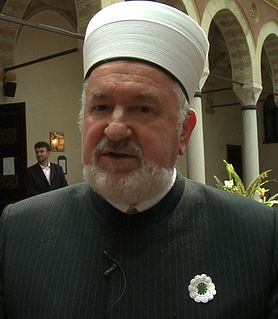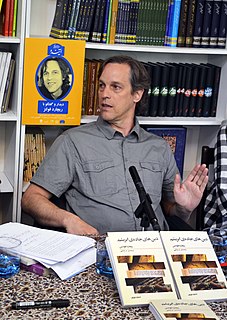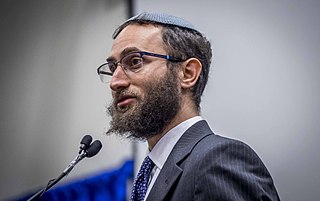Related Research Articles

Seyyed Hossein Nasr is an Iranian philosopher and University Professor of Islamic studies at George Washington University.
Spiritual ecology is an emerging field in religion, conservation, and academia recognizing that there is a spiritual facet to all issues related to conservation, environmentalism, and earth stewardship. Proponents of Spiritual Ecology assert a need for contemporary conservation work to include spiritual elements and for contemporary religion and spirituality to include awareness of and engagement in ecological issues.

Environmentalism or environmental rights is a broad philosophy, ideology, and social movement regarding concerns for environmental protection and improvement of the health of the environment, particularly as the measure for this health seeks to incorporate the impact of changes to the environment on humans, animals, plants and non-living matter. While environmentalism focuses more on the environmental and nature-related aspects of green ideology and politics, ecologism combines the ideology of social ecology and environmentalism. Ecologism is more commonly used in continental European languages, while environmentalism is more commonly used in English but the words have slightly different connotations.

Mustafa Cerić is a Bosnian imam who served as the Grand Mufti (Reis-ul-Ulema) of Bosnia and Herzegovina and is currently president of the World Bosniak Congress. He was also a candidate for a Bosniak member of the Presidency of Bosnia and Herzegovina at the 2014 general election.
Ecospirituality connects the science of ecology with spirituality. It brings together religion and environmental activism. Ecospirituality has been defined as "a manifestation of the spiritual connection between human beings and the environment." The new millennium and the modern ecological crisis has created a need for environmentally based religion and spirituality. Ecospirituality is understood by some practitioners and scholars as one result of people wanting to free themselves from a consumeristic and materialistic society. Ecospirituality has been critiqued for being an umbrella term for concepts such as deep ecology, ecofeminism, and nature religion.
Ecotheology is a form of constructive theology that focuses on the interrelationships of religion and nature, particularly in the light of environmental concerns. Ecotheology generally starts from the premise that a relationship exists between human religious/spiritual worldviews and the degradation or restoration and preservation of nature. It explores the interaction between ecological values, such as sustainability, and the human domination of nature. The movement has produced numerous religious-environmental projects around the world.
Evangelical environmentalism is an environmental movement in the United States in which some Evangelical Christians have emphasized biblical mandates concerning humanity's role as steward and subsequent responsibility for the care taking of Creation. While the movement has focused on different environmental issues, it is best known for its focus of addressing climate action from a biblically-grounded theological perspective.
Religion and environmentalism is an emerging interdisciplinary subfield in the academic disciplines of religious studies, religious ethics, the sociology of religion, and theology amongst others, with environmentalism and ecological principles as a primary focus.

Christian views on environmentalism vary among different Christians and Christian denominations.
Kenneth "Harry" Oldmeadow is an Australian academic, author, editor and educator whose works focus on religion, tradition, traditionalist writers and philosophy.
Sister Paula González, S.C., Ph.D., entered the Sisters of Charity of Cincinnati in 1954. She earned her doctorate in biology at the Catholic University in Washington, DC, and was a biology professor at the College of Mount St. Joseph in Cincinnati, Ohio, for 21 years.
İbrahim Özdemir is a Turkish philosopher, academic and an Islamic environmentalist. He is a professor of philosophy at Uskudar University and Director General of the Department of Foreign Affairs, the Ministry of National Education, Turkey.

Asoka Bandarage is a Sri Lankan academic specializing in international development, political economy, women and gender studies, multiculturalism, conflict analysis and resolution, peace and security, South Asia, Sri Lanka, population and ecology. She has headed the Women's Studies Program at Mount Holyoke College and also taught at institutions including Georgetown University’s Public Policy Institute in Washington, DC. She is also a yoga instructor.

Richard Foltz is a Canadian scholar of American origin. He is a specialist in the history of Iranian civilization—what is sometimes referred to as "Greater Iran". He has also been active in the areas of environmental ethics and animal rights.
The Islamic Foundation for Ecology and Environmental Science (IFEES) is an environmental organization founded in 1993 by Fazlun Khalid in Birmingham, England. The IFEES have produced a range of educational materials aimed at raising Muslims' awareness of environmental issues, and is involved in numerous conservation and education projects throughout the Muslim world, including "green audits" for mosques and a "Sustainable Living Islam summer camp. IFEES publishes a newsletter, EcoIslam, and has produced a film titled Clean Medina. The Muslim Green Guide to Reducing Climate Change was published by IFEES in 2008.

Yonatan Neril is an interfaith environmental advocate, NGO director, and rabbi. He founded and directs the Interfaith Center for Sustainable Development (ICSD), based in Jerusalem.
Roger S. Gottlieb is professor of philosophy and Paris Fletcher Distinguished Professor in the Humanities at Worcester Polytechnic Institute. He has written or edited 21 books, including two Nautilus Book Awards winners, and over 150 papers on philosophy, political theory, (environmental) ethics, religious studies, (religious) environmentalism, religious life, contemporary spirituality, the Holocaust, and disability. He is internationally known for his work as a leading analyst and exponent of religious environmentalism, for his passionate and moving account of spirituality in an age of environmental crisis, and for his innovative and humane description of the role of religion in a democratic society.
Islamic environmentalism is a strand of environmental philosophy as well as an Islamic movement that employs environmental principles derived from Islamic scriptures and traditions to the environment and the modern-day environmental crisis. Muslim environmentalists believe in God's absolute sovereignty over nature and emphasize humanity's role as God's vicegerent, making it their duty to protect and preserve the environment. Islamic environmentalism encompasses Islamic ecological philosophy, Sharia-based environmental law, and Islamic environmental activism.
Resacralization of nature is a term used in environmental philosophy to describe the process of restoring the sacred quality of nature. The primary assumption is that nature has a sanctified aspect that has been lost in modern times as a result of the secularization of contemporary worldviews. These secular worldviews are said to be directly responsible for the spiritual crisis in "modern man", which has ultimately resulted in the current environmental degradation. This perspective emphasizes the significance of changing human perceptions of nature through the incorporation of various religious principles and values that connect nature with the divine. The Iranian philosopher Seyyed Hossein Nasr first conceptualized the theme of resacralization of nature in contemporary language, which was later expounded upon by a number of theologians and philosophers including Alister McGrath, Sallie McFague and Rosemary Radford Ruether.
References
- ↑ Foltz, Richard (2013). "Ecology in Islam". In Runehov, Anne L. C.; Oviedo, Lluis (eds.). Encyclopedia of Sciences and Religions. Springer. p. 675. ISBN 978-1402082641.
- ↑ "Islamic environmentalism: The call to eco-jihad - Qantara.de". Qantara.de - Dialogue with the Islamic World. Retrieved 2021-01-11.
- ↑ Richard Foltz, Environmentalism in the Muslim World, New York: Nova Science, 2005, p. xiii
- ↑ "15 Green Religious Leaders" Grist magazine (24 July 2007)
- ↑ The Independent [ dead link ]
- ↑ "- U.S. Mission to Italy". Archived from the original on 2010-09-26. Retrieved 2010-10-31.